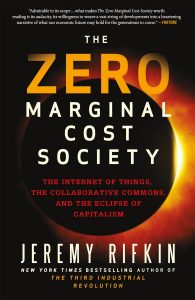N0 jobs? No ownership? No capitalism? No problem. For Jeremy Rifkin, a post-job and post-ownership future will propel humanity to a next level of humanity: the Homo Empathicus. Rifkin’s promise is that technology will liberate humanity from its material pursuits, so we can better focus on human relationships.
The title of the book is inspired by the massive economies of scale provided by digitization: once software or a digitally recorded film is uploaded to the internet, the cost of reproducing the file is essentially at zero marginal cost. Rifkin envisions an ambitious reorganization of society, as he predicts that “zero marginal cost” will be applied to other areas:
- Free renewable energy to power local communities.
- Free products made by free labour (automation & 3D printing), designed for free (open source), and powered by free energy (renewable)
- Free communication via the internet for humans and machines (Internet of Things)
Free is perhaps a generous hyperbole, but what Rifkin argues is that the cost associated with these three components have been reaching lower and lower towards zero marginal cost. The decline in cost will allow each community to become self-sufficient, paving the way for decentralization and the return to a society centered around communities.
Rifkin’s vision, of course, is neither far-fetched nor entirely unique. We already have Wikipedia to Coachsurfing and nascent IoT systems to solar power microgrids in Germany. His vision builds on various “new economies” ideas that are well known, such as the blockchain, sharing, collaborative, and open source economies.
Energy Sources & Human Consciousness?
Rifkin attempts a sweeping narrative of human history, where energy is the main paradigm that drives human development and even humanity’s social consciousness. From wind power to coal, Rifkin sees energy behind the drive towards urbanization (windmill power), formalized religion (hydraulic agriculture), and so on. Free energy via renewables is the next step to the next stage of human development.
Such view of history strongly echoes Don Edward Beck’s “Spiral Dynamics” concept, which describes a deterministic view of humanity’s sociocultural evolution from selfish individualism to emphatic collectivism. In Beck’s Spiral Dynamics, the end goal of humanity is reaching “collectivism” and “cosmic spirituality.” Along similar lines, Rifkin calls the end state of humanity the Emphatic Civilization, where humanity becomes globally connected as networked collectives, communalized in resource allocation, and emphatic in human behavior.
Ambitious Ideas, Many Assumptions
The book makes vast and generous assumptions of human behavior. Rifkin assumes that post-abundance – a world of free labour and energy – will turn humanity into an “Emphatic Civilization”. However, it could just easy turn into a Wall-E scenario where humans, emancipated from the demands of labour and survival, enjoy permeant distractions of materialism and vapid media consumption.
There are also the practical questions of who will pay and own these new systems of energy, IoT infrastructure, and manufacturing automation robots. It is not a given that it’ll be run by communities or cooperatives. Jason Lanier, a researcher at Microsoft, argues that the current titans of technology– from Uber to Google and Amazon – are pushing us towards corporate centralization of control. Lanier warns us that whoever owns the servers controls the world. This does not enable the Emphatic Civilization that Rifkin envisions.
Much Needed Optimism?
When reading Zero Marginal Cost Society, it is tempting be distracted by Rifkin’s cheerleading enthusiasm and ambitious, yet awkward, attempt to cobble together a grand narrative of human history. Yet, as a work about the future, Rifkin is successful in surveying our current era of technological upheaval, connecting them together, and extrapolating a plausible, better humanity. Indeed, given the global sense of uncertainty today, Rifkin optimistic vision of how humanity can move forward is a welcome contribution.
Note: This is part of the series of discussion at Houston Foresight on the topic of After Capitalism. — Daniel Riveong





